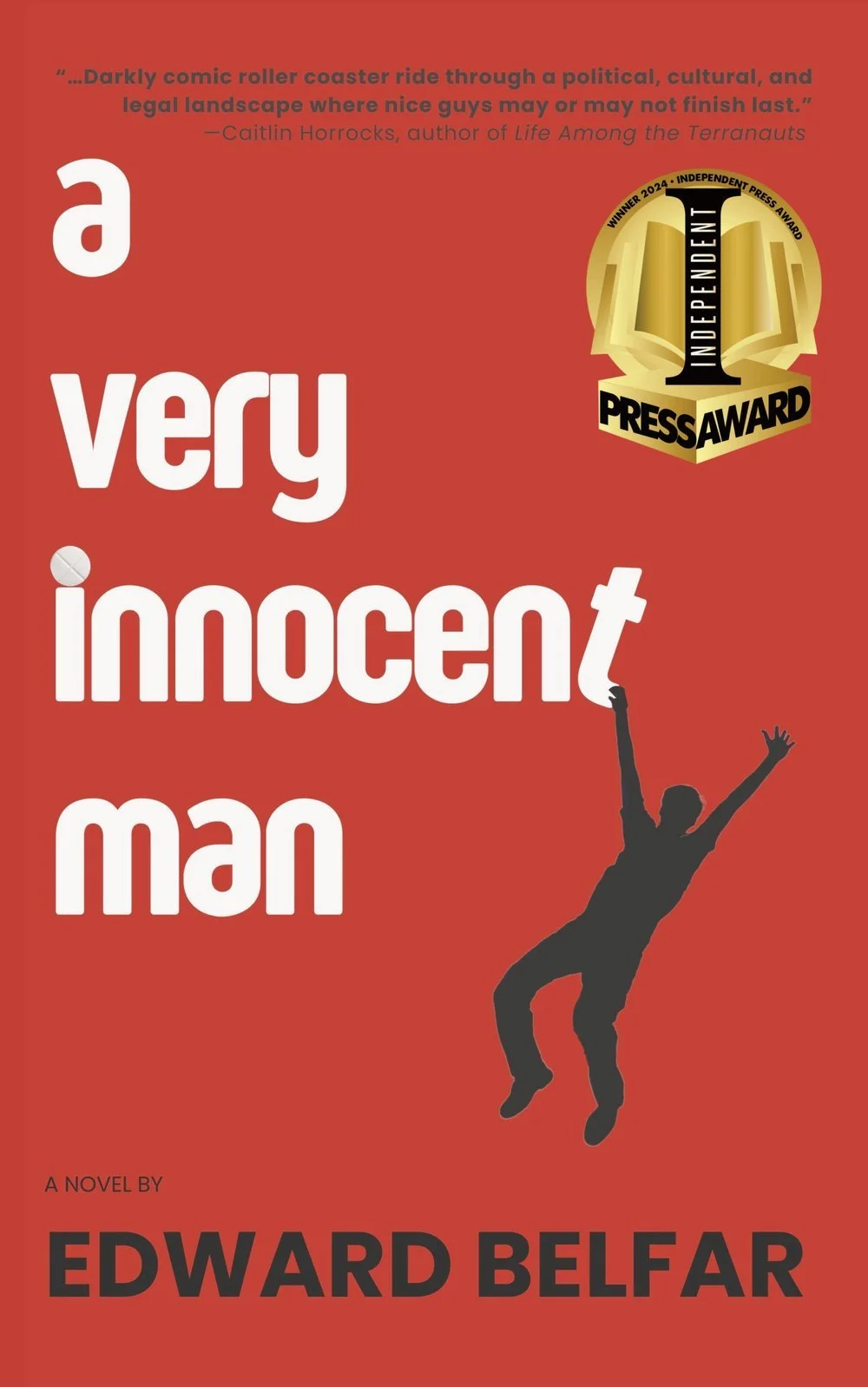A dark comedy about the opioid crisis
an interview with Edward Belfar
By Tom Navratil
Edward Belfar’s debut novel casts a scathing spotlight on the destructive, short-sighted greed currently prevailing among so many of the powerful in our county. A Very Innocent Man focuses on those exploiting the opioid addiction crisis, but could apply just as well to many other ongoing manifestations of corruption and cruelty. Though set primarily in and around New York City, many of the story’s threads tie back to Washington, DC, including a classic Congressional hearing set piece.
Belfar has spent most of his adult life in the Baltimore/D.C. area, teaching composition and literature, and, more recently, working for the U.S. Department of Agriculture. As you can imagine, he has strong feelings about the current administration’s disgraceful treatment of his friends and former colleagues at USDA, and of federal employees generally.
After growing up in Brooklyn, Queens, and Long Island, Belfar earned a B.A. in history and a Master’s degree in creative writing at the State University of New York at Stony Brook. He went on to attain a PhD in literature from Temple University. Beginning as a teenager, he has pursued his passion for storytelling with great dedication. He published a short story collection, Wanderers, and his fiction and essays have appeared in numerous literary journals, including Shenandoah, The Baltimore Review, Potpourri, Confrontation, Natural Bridge, Schuylkill Valley Journal, and Tampa Review. One of his stories won the Sports Literature Association’s annual competition, and another was nominated for a Pushcart Prize. He lives in Maryland with his wife Kathleen and a very strong-willed Corgi (which he notes is probably a redundancy).
As a writer working in a similar sector of the literary landscape, I highly appreciated the opportunity to interview Edward about the inspirations and motivations driving A Very Innocent Man and about his creative journey.
Over the years, you have published numerous short stories and literary essays. Did you have a novel in your sights all along?
My first book, Wanderers, was a collection of stories loosely linked by theme. I had tried my hand at novel-writing a couple of times before then, but I experienced much greater success in writing short fiction. By the time Wanderers came out, in 2012, I thought of myself as strictly a short-story writer. A Very Innocent Man began life as a short story under a different title. Even while writing that story, however, I saw a bunch of different threads emerging, and I sensed that I could develop the piece into something larger.
A Very Innocent Man did not take shape right away. The first draft suffered from some of the same pitfalls as my previous novelistic efforts had. In revising the manuscript, I focused on plotting, pacing, and maintaining suspense, and, in the process, acquired an education in novel-writing, as well as a growing belief in my abilities as a novelist. Receiving a 2024 Independent Press Award in the Humor/Satire category for A Very Innocent Man gave me an additional confidence boost. Now that I have caught the novel-writing bug, I am working on another one.
What drew you to the opioid crisis as the subject for dark comedy?
My wife used to work as a pharmacist, and I heard many stories from her and her colleagues about patients who would come into the pharmacy with questionable painkiller prescriptions from out-of-town doctors. Of course, there has been a great deal of media coverage about the effects of the opioid epidemic on individuals, families, and communities, but much less study of the supplier side of the equation, the doctors who dispense the opioid prescriptions. I began to wonder why professionals who took oaths to heal would not only violate those oaths but would risk their livelihoods, their reputations, and their freedom for a little extra profit. Was it simple greed that drove them? Thrill-seeking? A little of both? Those musings provided the seed out of which the novel grew.
In your conception, was Dr. Robert Rosen, the protagonist of A Very Innocent Man, ever truly innocent, or had he always been a bad seed? Over the course of the novel, Dr. Rosen repeats his patterns of unconstructive interactions with those closest to him. Are you suggesting that the real fiction is the idea that people like that ever change?
The term “bad seed” carries with it a sense that one is destined to do evil, and it would seem to foreclose any possibility of redemption. Such people exist, certainly, but I do not see Dr. Rosen quite that way. At times, usually when feeling vulnerable or fearful, such as after suffering an anxiety attack that mimics a heart attack or while awaiting his sentencing hearing, he reflects on his life, senses that it has gone very much off course, and even vows to do better in some vague way. Those intervals of clarity, however, prove fleeting. As soon as the immediate crisis has passed, he reverts to his former ways of acting and thinking, blaming others for his misfortunes and plotting revenge against them. No matter how poorly he treats his patients and family, no matter how flagrantly he violates his Hippocratic Oath and the law, his sense of his own moral innocence remains impregnable, rendering him incapable of experiencing genuine remorse and accepting responsibility for his crimes and failed relationships. His occasional moments of insight suggest that the possibility of redemption exists for him, but throughout the novel, his blindness and self-righteousness prevent him from acting on that possibility.
Lawyers for pill-pushers could make inviting targets for mockery, but in your novel they come off well. Was that a planned choice, or did it emerge in the process of creating the story?
I did not begin with any preconceptions about the lawyers in the story. The question that concerned me instead was how they would interact with Dr. Rosen. He is the sort of client that ethical lawyers dread: an angry, vengeful type who sees the courts as a venue in which to obliterate his adversaries, who thinks that he knows the law better than his attorneys do, and who views his retainer as a downpayment on the favorable result to which he is entitled. Both Pat McKinley, who represents Dr. Rosen in a malpractice case involving the death of a nursing home patient in his care, and Andrew Le Bâtard, who does so in the criminal case, know that to follow the aggressive course that Dr. Rosen urges on them would only compound his problems. Both struggle to restrain his worst instincts and make him understand the daunting evidence against him in order that they may obtain the best possible outcomes for him under the dismal circumstances. They both act ethically, but doing so often brings them into conflict with the obstreperous Dr. Rosen.
A Very Innocent Man skewers many things that needed skewering in the first Trump administration. Did you ever find yourself wondering whether your story was veering too close to straight-up reporting?
The only instance where I was concerned about veering too closely to straight-up reporting was when I had Dr. Rosen cite a few statistics on opioid abuse in the television talk that he gives near the beginning of the novel. I worried that including that information could cause the scene to drag, but I kept it in because I imagined that he would have featured it in his talk.
Otherwise, I thoroughly enjoyed the skewering, and I have had more than a few readers remark that they could tell that I had great fun in writing the novel. A Very Innocent Man represented something of a departure for me in that while my previous fiction focused tightly on the lives of individual characters in moments of crisis, in the novel, I was attempting to paint on a wider canvas. I wanted to explore the corrosive effects of the first Trump administration on the broader culture, i.e., how the corruption, greed, shamelessness, and general sense of impunity filtered down from the Oval Office and made American life coarser, meaner, and uglier than it had been before. Often to his detriment, Dr. Rosen by and large embraces the corrosive values of that era.
Can you share some of your literary and comic influences? What are you reading these days?
Among my favorite comic or satirical writers are Mikhail Bulgakov, Evelyn Waugh, and Walker Percy, on whose work I wrote my dissertation at Temple University. Percy’s 1971 novel Love in the Ruins probably provided the most direct influence on A Very Innocent Man, in terms of scope and tone, though not subject matter. Percy sets his novel in a dystopian near-future in which America’s political and racial divisions have become so acute that the survival of the union appears in jeopardy, though in keeping with the comic tone of the novel, the mildly optimistic ending suggests that we will somehow muddle through. A Very Innocent Man is set in a slightly altered present—which now seems like a century ago—in which a possible American apocalypse appears not quite so near on the horizon as in Love in the Ruins but in which our civic bonds have become similarly frayed. Were I writing the same novel today, it would have a darker tone.
As for my more recent reading, I just finished a rereading of Life with a Star by the Czech writer Jiri Weil, a harrowing but also bleakly comic account of life in Prague under Nazi occupation. I have also leaned a little more toward nonfiction of late than I have in the past. My selections have included American Midnight, by Adam Hochschild, an account of the original, post-World War I Red Scare, an era that bears many unsettling parallels with our own; Hitler’s First Hundred Days, by Peter Fritzsche; and Autocracy, Inc., by Anne Applebaum. You may notice some common themes there.
It is quite clear that Edward Belfar has plenty more to say. We look forward to reading what he comes up with next.
Purchase your copy of A Very Innocent Man from Bookshop and learn more about the author on his website: www.edwardbelfar.com
Edward Belfar is the author of the novel A Very Innocent Man, published by Flexible Press in 2023. His previous book, Wanderers, a collection of short stories, was published by Stephen F. Austin State University Press in 2012. He lives with his wife in Maryland.
Tom Navratil is the author of Dog’s Breakfast, a comedy of international intrigue. ReadNorah’s interview with Tom, covering his novel, his past career in the U.S. foreign service, and many things in between.



